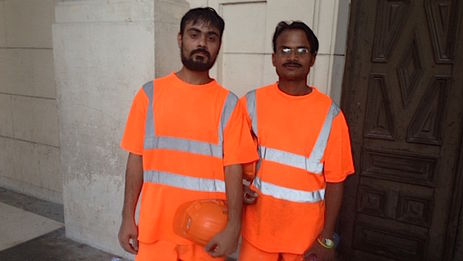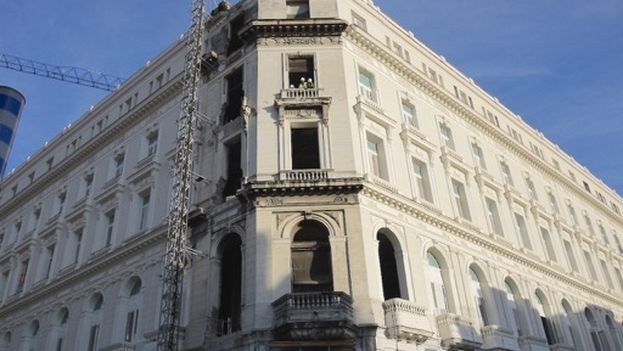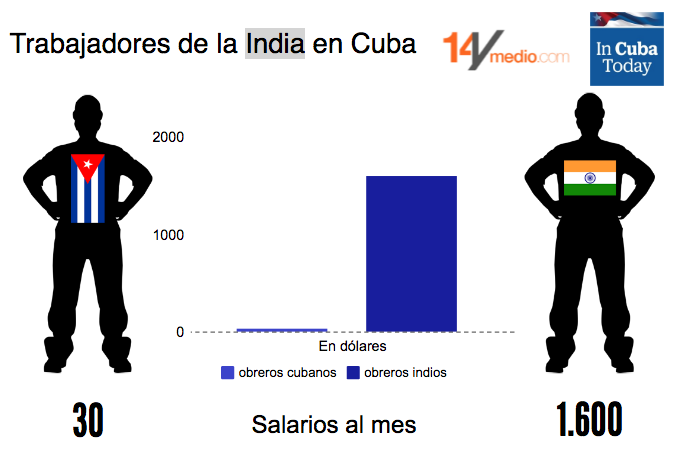
![]() 14ymedio, Mario Penton, Miami, 17 October 2016 — Three months after the revelation of the presence of workers from India in the construction of a luxury hotel in Havana, on Saturday the Cuban press mentioned, and tried to explain, the fact that domestic workers have been replaced by foreign workers with the argument that the Asians perform “three or four times” better.
14ymedio, Mario Penton, Miami, 17 October 2016 — Three months after the revelation of the presence of workers from India in the construction of a luxury hotel in Havana, on Saturday the Cuban press mentioned, and tried to explain, the fact that domestic workers have been replaced by foreign workers with the argument that the Asians perform “three or four times” better.
“The result of their work is very high quality. Their presence results in taking great advantage of the workday, resulting in greater productivity,” said a report by the journalist Marianela Martin, published in Juventud Rebelde (Rebel Youth) and reproduced on the website Cubadebate.
What the Cuban newspaper does not mention is that, according to Reuters, the wages paid by the French company Bouygues to the Indian builders is some 1,600 dollars a month, 53 times more than Cubans doing the same work are paid (some 30 dollars). In the best of cases, with a bonus included, Cubans can earn a maximum of 100 dollars a month, with the Asians still earning 16 times more.
As the main reason for the hiring of foreigners, the directors of the Almest Real Estate Company argue the mobility of people trained in Cuban schools, who seek better paid work.
The publication notes, however, that “there is a permanent improvement” in the living conditions of the Cuban workers, among which it cites the constant assurance of work. Another “privilege” mentioned is “transportation from the shelters where they live to the worksite” and “the food offered is good, and so are the conditions where they spend the night.”
It also mentions “a study for the application of a new payment system,” but clarifies that it will not be “wage reform.”
Experts consulted by this newspaper corroborated that contracting for foreign personnel for tourist projects in Cuba is a common practice, but the case of the Indian workers is notable for the numbers involved. They are not only working in Havana, but also in the construction of several hotels in Varadero and other areas of the country.
The civil engineer Bladimir Ayra Estrada, vice president of the Arcos BBI International Economic Partnership, involved in construction in Cuba, explains that “with the presence of workers from India in the projects, jobs that have been lost are being recovered.”

According to Ayra Estrada, along with the Indian workers, Cubans are being put to work to learn the trades. The manager recognized that his business is taking fundamental advantage of recent graduates in technical courses related to construction, because they leave after finishing their social service (a three year period in which graduated students must work in the specialty in which they graduated).
Electricians, carpenters, plumbers and masons working on Cuban hotels being built in tourist areas are usually hired through the 13 employment agencies in the country. These are state enterprises created to recruit the best of the skilled workers on the island. They hire workers for wages in Cuban pesos (CUP) and in some cases with bonuses in Cuban Convertible pesos (CUC: 1 CUC = 25 CUP) while offering their services to foreign companies, adjusting their prices in dollars. It is a business that allows the state to realize significant gains, as it gets most of the benefits*.

The Cuban government is committed to promoting tourism as a way to boost its stagnant economy. Last year Cuba hosted more than three and a half million tourists, so it has had to make major adjustments and investments to balance the demand for rooms with supply.
The Manzana hotel, where the largest contingent of Indians is working, is located in Manzana de Gómez, which was the first major commercial center of the Cuban capital. Completion is scheduled for early 2017 and the project will be operated by the Kempinski International Hotel Chain and the Business Administration Group (GAESA), which belongs to the Cuban Armed Forces.
*Translator’s note: The State agencies collect the wages paid for the Cuban workers and pass on to the workers only a small share, retaining the rest in the government coffers.
